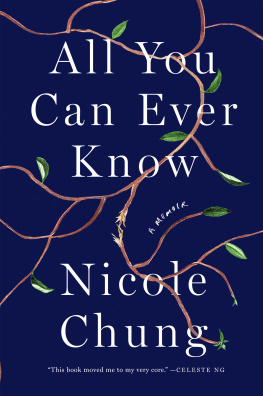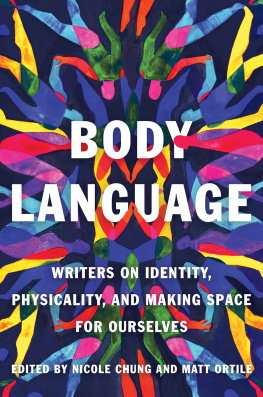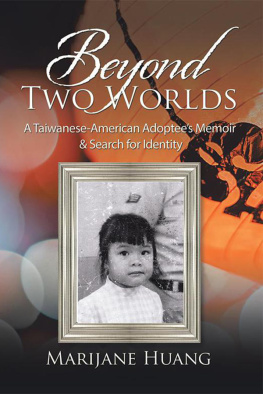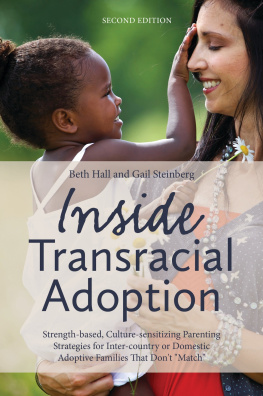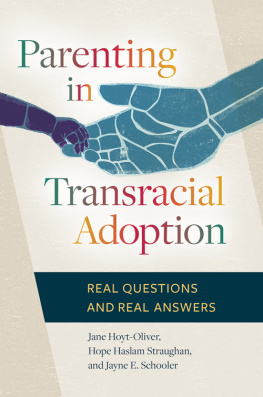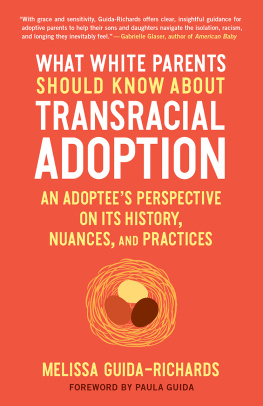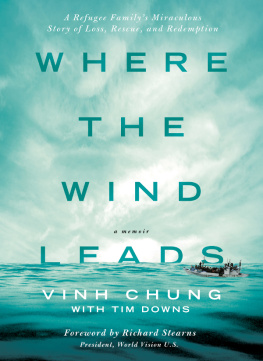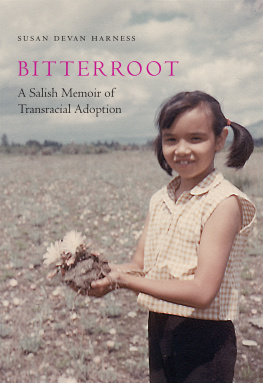


The author has tried to re-create events, locales, and conversations based on her own memories and those of others. In some instances, in order to maintain their anonymity, certain names, characteristics, and locations have been changed.
Copyright 2018 by Nicole Chung
First published in the United States in 2018 by Catapult (catapult.co)
All rights reserved
ISBN: 978-1-936787-97-5
eISBN: 978-1-936787-98-2
Catapult titles are distributed to the trade by Publishers Group West
Phone: 866-400-5351
Library of Congress Control Number: 2018938840
Printed in the United States of America
10 9 8 7 6 5 4 3 2 1
for Cindy
and for our daughters
... I wanted to know,
whoever I was, I was
MARY OLIVER , Dogfish
What? You too? I thought I was the only one.
C. S. LEWIS , The Four Loves
Part I


T he story my mother told me about them was always the same.
Your birth parents had just moved here from Korea. They thought they wouldnt be able to give you the life you deserved.
Its the first story I can recall, one that would shape a hundred others once I was old enough and brave enough to go looking.
When I was still youngthree or four, Ive been toldI would crawl into my mothers lap before asking to hear it. Her arms would have encircled me, solid and strong where I was slight, pale and freckled against my light brown skin. Sometimes, in these half-imagined memories, I picture her in the dress she wore in our only family portrait from this era, lilac with flutter sleevesan oddly delicate choice for my solid and sensible mother. At that age, a shiny black bowl cut and bangs would have framed my face, a stark contrast to the reddish-brown perm my mother had when I was young; I was no doubt growing out of toddler cuteness by then. But my mom thought I was beautiful. When you think of someone as your gift from God, maybe you can never see them as anything else.
How could they give me up?
I must have asked her this question a hundred times, and my mother never wavered in her response. Years later I would wonder whether someone told her how to comfort meif she read the advice in a book, or heard it from the adoption agencyor if, as my parent, she simply knew what she ought to say. What I wanted to hear.
The doctors told them you would struggle all your life. Your birth parents were very sad they couldnt keep you, but they thought adoption was the best thing for you.
Even as a child, I knew my line, too.
They were right, Mom.
By the time I was five or six years old, I had heard the tale of my loving, selfless birth parents so many times I could recite it myself. I collected every fact I could, hoarding the sparse and faded glimpses into my past like bright, favorite toys. This may be all you can ever know , I was told. It wasnt a joyful story through and through, but it was their story, and mine, too. The only thing we had ever shared. And as my adoptive parents saw it, the story could have ended no other way.
So when people asked about my family, my features, the fate Id been dealt, maybe it isnt surprising how I answeredfirst in a childish, cheerful chirrup, later in the lecturing tone of one obliged to educate. I strove to be calm and direct, never giving anything away in my voice, never changing the details. Offering the story Id learned so early was, I thought, one way to gain acceptance. It was both the excuse for how I looked, and a way of asking pardon for it.
Looking back, of course I can make out the gaps; the places where my mother and father must have made their own guesses; the pauses where harder questions could have followed: Why didnt they ask for help? What if they had changed their minds? Would you have adopted me if youd been able to have a child of your own?
Family lore given to us as children has such hold over us, such staying power. It can form the bedrock of another kind of faith, one to rival any religion, informing our beliefs about ourselves, and our families, and our place in the world. When tiny, traitorous doubts arose, when I felt lost or alone or confused about all the things I couldnt know, I told myself that something as noble as my birth parents sacrifice demanded my trust. My loyalty.
They thought adoption was the best thing for you.
Above all, it was a legend formed and told and told again because my parents wanted me to believe that my birth family had loved me from the start; that my parents, in turn, were meant to adopt me; and that the story unfolded as it should have. This was the foundation on which they built our family. As I grew, I too staked my identity on it. The story, a lifeline cast when I was too young for deeper questions, continued to bring me comfort. Years later, grown up and expecting a child of my own, I would search for my birth family still wanting to believe in it.

O ne afternoon in the summer of 2003, two people I had just met sat across from me in their sunny apartment and asked if I thought they should adopt. They had tried for a few years and been unable to conceive; now they wanted to adopt a child from another country. They named some programs they were interested in. None would lead to them bringing home a white child.
They asked if I ever felt like my adoptive parents werent my real parents.
Never, I said firmly.
They asked if I had been in touch with my birth family.
No, I said, I hadnt.
They asked if there had ever been any issues when I was growing up.
I felt something like panic, the sudden shame of being found out.
Perhaps confusion was all they could read on my face, because one of them attempted to clarify: Had I ever minded it? Not being white, like my parents?
I wanted to answer. I liked this couple, and I knew it was my job to offer them the comfort, the encouragement they so plainly deserved. Did I mind not being white? It amounted to asking if I minded being Korean; yes, I minded , or no, I didnt mind , both seemed too mild for how Id felt.
The truth was that being Korean and being adopted were things I had loved and hated in equal measure. Growing up, I was the only Korean most of my friends and family knew, the only Korean I knew. Sometimes the adoptionthe abandonment, as I could not help but think of it when I was very youngupset me more; sometimes my differences did; but mostly, it was both at once, race and adoption, linked parts of my identity that set me apart from everyone else in my orbit. I could neither change nor deny these facts, so I worked to reconcile myself to them. To tamp down the stirring of anger or confusion when that proved impossible, time and time again.
All members of a family have their own ways of defining the others. All parents have ways of saying things about their children as if they are indisputable facts, even when the children dont believe them to be true at all. Its why so many of us sometimes feel alone or unseen, despite the real love we have for our families and they for us. In childhood, I was uncertain who I was supposed to be, even as I resisted some of my adoptive relatives interpretationsboth youre our Asian Princess! and of course we dont think of you as Asian. I believe my adoptive family, for the most part, wanted to ignore the fact that I was the product of people from the other side of the world, unknown foreigners turned Americans. To them, I was not the daughter of these immigrants at all: by adopting me, my parents had made me one of them.
Next page
